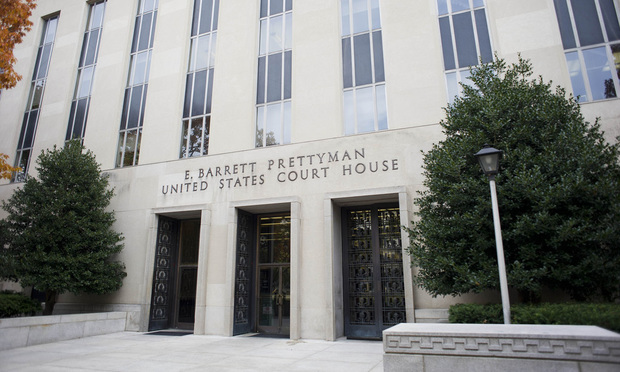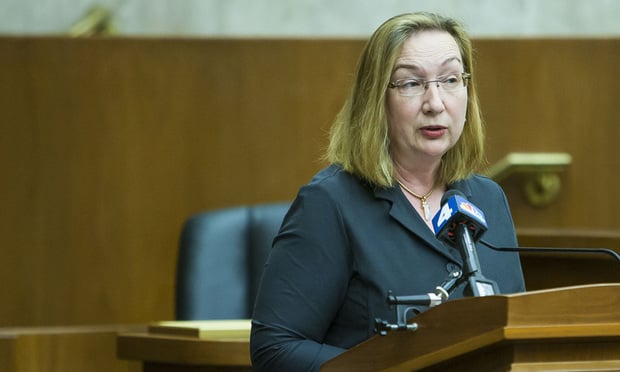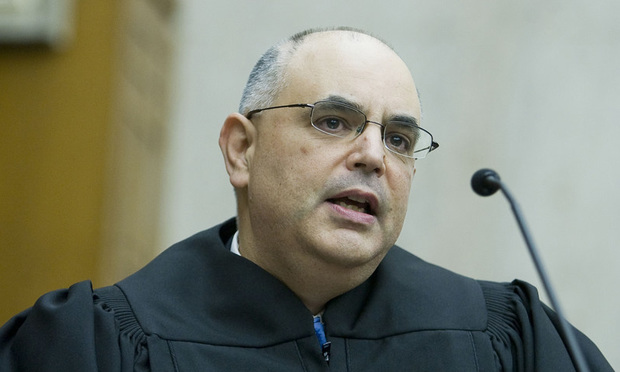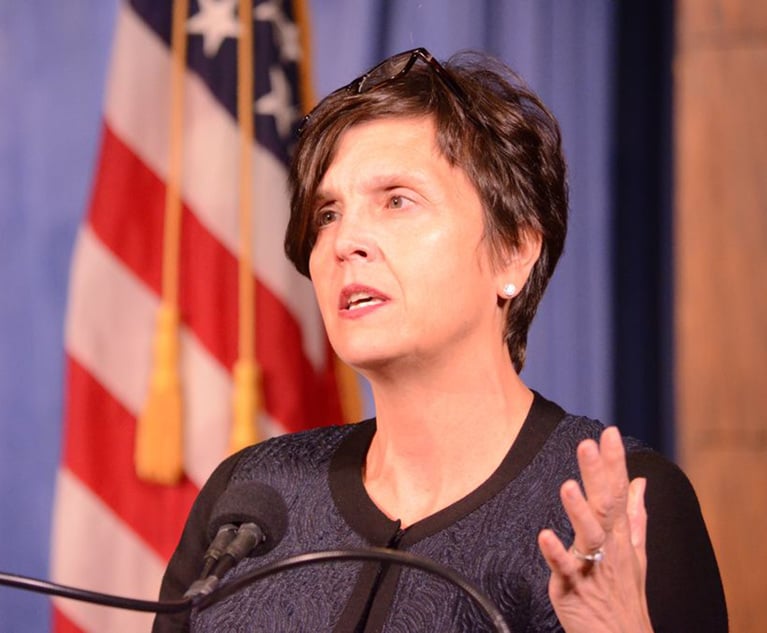At DC's Federal Trial Court, Judges and Lawyers Grapple With Coronavirus Pandemic
At a hearing in one case, a public records dispute involving the U.S. Justice Department, the novel coronavirus appeared to provide some perspective.
March 12, 2020 at 09:24 PM
5 minute read
 E. Barrett Prettyman Court House in Washington, D.C. (Photo: Diego M. Radzinschi/ALM)
E. Barrett Prettyman Court House in Washington, D.C. (Photo: Diego M. Radzinschi/ALM)
On an unusually quiet Thursday in the nation's capital, a delegation visiting from several African countries had just reached the top-floor of the E. Barrett Prettyman Courthouse in Washington when a court official received a call from the State Department.
As countries across the globe imposed travel restrictions in response to the novel coronavirus, there were concerns that the visitors would be indefinitely stranded in the United States if they did not leave soon. Their tour of Washington's federal trial court would have to be cut short.
After huddling quickly for a photograph inside the ceremonial courtroom—a stately forum featuring statues of Moses and Hammurabi—the group made its way to the exit, passing prominently displayed hand sanitizer dispensers before piling into a limousine bus bound for the airport. Meanwhile, judges made preparations for handling cases amid the coronavirus crisis, a pandemic that has claimed thousands of lives and disrupted everyday existence, ushering in a period of frequent hand-washing and a widespread shunning of public places and human contact.
In nearby Alexandria, Virginia, the federal court announced Thursday it was suspending tours, naturalization proceedings and other gatherings unrelated to pending cases, citing concerns about the coronavirus. The U.S. District Court for the District of Columbia announced restricted access to the downtown Washington courthouse, with measures similar to those implemented in courts from California to New York.
 Chief Judge Beryl Howell of the U.S. District Court for the District of Columbia. Photo by Diego M. Radzinschi/ALM
Chief Judge Beryl Howell of the U.S. District Court for the District of Columbia. Photo by Diego M. Radzinschi/ALM"We will continue to assess the ongoing need for the entry restrictions and update as warranted. We are taking this temporary action in response to the COVID-19 pandemic and out of concern for the health and safety of the courthouse community," Chief Judge Sri Srinivasan of the D.C. Circuit and Chief Judge Beryl Howell of the trial court said in a joint statement.
From the dispensers of hand sanitizer—always just steps and a squirt away from nearly all spots in the courthouse—to routine proceedings, judges and lawyers were already responding to COVID-19.
At a hearing in one case, the coronavirus appeared to provide some perspective.
U.S. District Judge Rudolph Contreras heard arguments in a case brought by Protect Democracy, a group seeking access to documents related to the U.S. drone strike in Iraq that killed Qassim Soleimani, a major general in the Islamic Revolutionary Guard Corps who commanded Iran's elite security and intelligence forces. In the brief hearing, Contreras pressed a Protect Democracy lawyer about how, as a "practical matter," he should go about determining whether the group's public records request was so important that it should leapfrog others awaiting the government's review.
Noting the novel coronavirus' near-monopoly on the public's attention, Contreras said the early January drone strike "seems like old news." Contreras asked what "objective standards" he could apply to determine whether "one thing is more important than the next."
At one point, Contreras questioned where the drone strike would rank on a Gallup poll of recent events that grabbed the public's attention. "How high on the list should that be?" he asked. "And should I care?"
The group's lawyer, John Paredes, stressed the drone strike that killed Soleimani was an issue of "war and peace" that appeared at the time to bring the United States to the brink of war with Iran.
"This is different than an average drone strike," he said, adding that he did not mean to "diminish the importance of coronavirus" but that, more than two months after the strike, there was still a "risk of escalation into a hot war."
"This is a very serious escalation, the end of which we don't know," he said.
Protect Democracy is seeking a trove of records, but on Thursday, Paredes emphasized that the Justice Department has so far not acknowledged whether its Office of Legal Counsel issued an opinion related to the drone strike on Soleimani. Immediately after the strike, the Trump administration confronted questions about whether it had legal justification for killing the Iranian military leader, with Democratic lawmakers protesting that the attack lacked congressional approval.
Paredes on Thursday said it "really shouldn't take more than five minutes, a bare minimum of five minutes," for the Justice Department to determine whether an OLC memo exists. Justice Department lawyer Kari D'Ottavio said she did not know—"at this time"—whether the office had issued an opinion. After being granted expedited processing for its records request, she said, the group was demanding an "accelerated version of expedited processing."
"They're just clearly not entitled to that," she said.
 U.S. District Judge Rudolph Contreras. (Photo: Diego M. Radzinschi/ ALM)
U.S. District Judge Rudolph Contreras. (Photo: Diego M. Radzinschi/ ALM)Contreras ordered the Justice Department to inform the group by Thursday as to whether the Office of Legal Counsel had issued an opinion. Before adjourning, he scheduled a court hearing for next week.
But the hearing, set for Thursday afternoon, came with a caveat: "Assuming people still interact with one another."
Read more:
We Navigated Crises. Here's How to Prepare Your Business in the Coronavirus Era.
As Coronavirus Spreads, Some Courts Shutter, Others Carry On
Law School Supreme Court Moot Sessions Carry On in Virus Era
This content has been archived. It is available through our partners, LexisNexis® and Bloomberg Law.
To view this content, please continue to their sites.
Not a Lexis Subscriber?
Subscribe Now
Not a Bloomberg Law Subscriber?
Subscribe Now
NOT FOR REPRINT
© 2025 ALM Global, LLC, All Rights Reserved. Request academic re-use from www.copyright.com. All other uses, submit a request to [email protected]. For more information visit Asset & Logo Licensing.
You Might Like
View All
Skadden and Steptoe, Defending Amex GBT, Blasts Biden DOJ's Antitrust Lawsuit Over Merger Proposal
4 minute read
'Lack of Independence' or 'Tethered to the Law'? Witnesses Speak on Bondi
4 minute read
Trending Stories
Who Got The Work
J. Brugh Lower of Gibbons has entered an appearance for industrial equipment supplier Devco Corporation in a pending trademark infringement lawsuit. The suit, accusing the defendant of selling knock-off Graco products, was filed Dec. 18 in New Jersey District Court by Rivkin Radler on behalf of Graco Inc. and Graco Minnesota. The case, assigned to U.S. District Judge Zahid N. Quraishi, is 3:24-cv-11294, Graco Inc. et al v. Devco Corporation.
Who Got The Work
Rebecca Maller-Stein and Kent A. Yalowitz of Arnold & Porter Kaye Scholer have entered their appearances for Hanaco Venture Capital and its executives, Lior Prosor and David Frankel, in a pending securities lawsuit. The action, filed on Dec. 24 in New York Southern District Court by Zell, Aron & Co. on behalf of Goldeneye Advisors, accuses the defendants of negligently and fraudulently managing the plaintiff's $1 million investment. The case, assigned to U.S. District Judge Vernon S. Broderick, is 1:24-cv-09918, Goldeneye Advisors, LLC v. Hanaco Venture Capital, Ltd. et al.
Who Got The Work
Attorneys from A&O Shearman has stepped in as defense counsel for Toronto-Dominion Bank and other defendants in a pending securities class action. The suit, filed Dec. 11 in New York Southern District Court by Bleichmar Fonti & Auld, accuses the defendants of concealing the bank's 'pervasive' deficiencies in regards to its compliance with the Bank Secrecy Act and the quality of its anti-money laundering controls. The case, assigned to U.S. District Judge Arun Subramanian, is 1:24-cv-09445, Gonzalez v. The Toronto-Dominion Bank et al.
Who Got The Work
Crown Castle International, a Pennsylvania company providing shared communications infrastructure, has turned to Luke D. Wolf of Gordon Rees Scully Mansukhani to fend off a pending breach-of-contract lawsuit. The court action, filed Nov. 25 in Michigan Eastern District Court by Hooper Hathaway PC on behalf of The Town Residences LLC, accuses Crown Castle of failing to transfer approximately $30,000 in utility payments from T-Mobile in breach of a roof-top lease and assignment agreement. The case, assigned to U.S. District Judge Susan K. Declercq, is 2:24-cv-13131, The Town Residences LLC v. T-Mobile US, Inc. et al.
Who Got The Work
Wilfred P. Coronato and Daniel M. Schwartz of McCarter & English have stepped in as defense counsel to Electrolux Home Products Inc. in a pending product liability lawsuit. The court action, filed Nov. 26 in New York Eastern District Court by Poulos Lopiccolo PC and Nagel Rice LLP on behalf of David Stern, alleges that the defendant's refrigerators’ drawers and shelving repeatedly break and fall apart within months after purchase. The case, assigned to U.S. District Judge Joan M. Azrack, is 2:24-cv-08204, Stern v. Electrolux Home Products, Inc.











